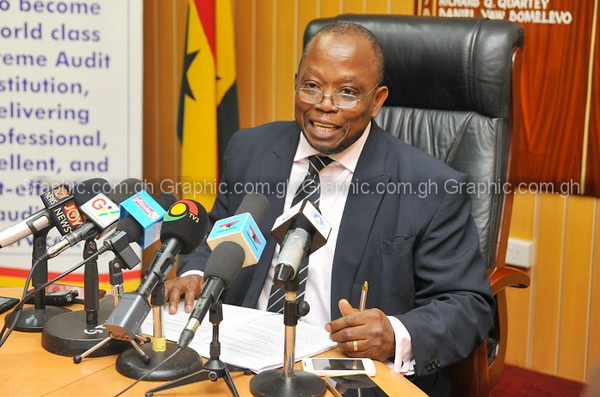
Domelevo, law facts vs fiction
A letter dated Monday, June 9, 2020, from the Presidential outfit signed by the Director of Communications, Mr Eugene Arhin, directing the Auditor General to proceed on his accumulated annual leave, taking effect from July 2020, has over the past weeks caused consternation among many.
Varied concerns, questions of the constitutionality of the executive directive from the President, with some contending such directives to be a violation of Article 187(7) of the 1992 Constitution, which protects the office and, as such, apart from the compulsory retirement age of 60 years the A-G’s tenure cannot be disturbed by the President’s directive, couched as accumulated leave, have all been asked.
Advertisement
Suit
Professor Stephen Kweku Asare followed up at the Supreme Court, seeking a declaration that the President’s appointment of Mr Asiedu to act as A-G was inconsistent with or in contravention of Articles 187(1), 187(7)(a) and further called for an interlocutory injunction from the court to set aside the 167 accumulated leave days of Mr Domelevo, which took effect on July 1, 2020.
Independence
The issue has been an exceptional area of concern due to the powers conferred by the Constitution.
Over the past few weeks, several questions, such as, whether or not the A-G has total independence, have been asked. Some have questioned the limits of the AG’s independence.
Others have asked if thre are any forms of checks or balances of that office in the discharge of functions.
Office
Generally, the office of the Auditor-General is believed to be an important body in our governance structure. Again, according to the Audit service Act (584) section 10(5), “the salary and allowances payable, and the facilities and privileges available to the Auditor-General shall be determined by the President on the recommendations of a committee of not more than five persons appointed by the President, acting in accordance with the advice of the Council of State.”
This could imply that, even though the AG is noted to be independent, there is a limit on grounds that the salaries and other social benefits payable to the A-G, as of right is regulated by the President or a committee appointed by him, acting in accordance with the advice of the Council of State.
Again, Section 10(9) of Act 584 states: the Auditor-General may at any time resign his office in writing addressed to the President,” which in effect implies or presupposes a higher authority to which the A-G responds to regardless of its level of independence.
Lastly, the A-G’s report submitted to Parliament under Article 187(6) at the end of every financial year is subject to debate on the floor of Parliament.
This could also imply that the report following its reading in Parliament is not regarded as the final working document of the A-G until such report undergoes scrutiny and finally certified by Parliament; hence, a limitation to the independence of the AG.
The writer is a law student of the Wisconsin University International College



